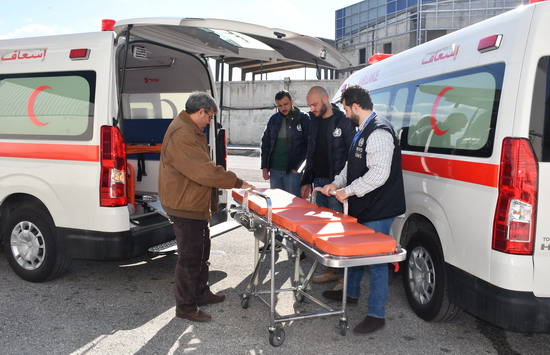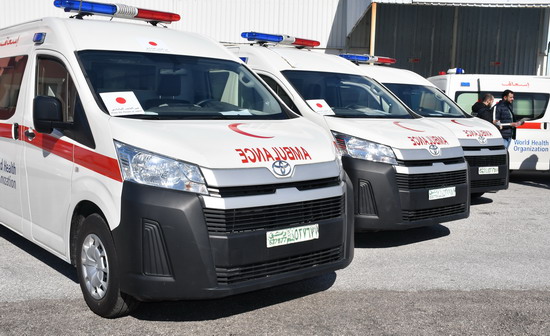
 17 February 2020 – WHO handed over 6 equipped ambulances to the Ministries of Health and Higher Education thanks to a generous donation from the Government of Japan. These ambulances are a vital boost to WHO’s efforts to support emergency and ambulance services with a view to improving the health outcomes of internally displaced people and local communities in south and northwest Syria, especially mothers and children, through reducing avoidable morbidity and mortality. In addition to the ambulances and as part of this same initiative, the Japanese Government is also providing 2 mobile clinics that will enhance the provision of primary health care services in the governorates of Aleppo and Al-Qunaitra.
17 February 2020 – WHO handed over 6 equipped ambulances to the Ministries of Health and Higher Education thanks to a generous donation from the Government of Japan. These ambulances are a vital boost to WHO’s efforts to support emergency and ambulance services with a view to improving the health outcomes of internally displaced people and local communities in south and northwest Syria, especially mothers and children, through reducing avoidable morbidity and mortality. In addition to the ambulances and as part of this same initiative, the Japanese Government is also providing 2 mobile clinics that will enhance the provision of primary health care services in the governorates of Aleppo and Al-Qunaitra.
Emergency medical situations require a prompt response and any delay can have serious consequences. The ambulances will strengthen the efforts of the 2 ministries to respond to the health needs of vulnerable people, especially in remote areas, as patients will be able to receive first aid support while on route to the nearest health facility.
“WHO’s priority is to support the Ministry of Health to prevent avoidable loss of life and further complications as a result of injury by providing immediate response and medical treatment to ensure the patients' survival,” said Dr Nima Abid, acting WHO Representative in Syria. “This new donation will be a major boost to enhancing emergency services provision in the country and will play a critical role in strengthening the referral system, a key aspect in the achievement of universal health coverage,” added Dr Abid.
While the 6 ambulances will strengthen the response to emergency and trauma cases and facilitate the referral of patients to hospitals, the 2 mobile clinics will provide primary health care services to rural areas in Aleppo and Al-Qunaitra where the number of returnees has significantly increased. On average, each mobile clinic can serve more than 3000 patients monthly. These include patients suffering from health problems, such as respiratory infections and chronic diseases, in addition to pregnant women and children in need of medical care.
 Based on the Health Resources and Service Availability Monitoring System at WHO (HeRAMS), the status of functionality of assessed public health facilities (hospitals and health centres) at the end of December 2019 was as follows:
Based on the Health Resources and Service Availability Monitoring System at WHO (HeRAMS), the status of functionality of assessed public health facilities (hospitals and health centres) at the end of December 2019 was as follows:
- Across Syria: Out of 1925 assessed public health facilities, 907 (47%) were reported fully functioning, 425 (22%) partially functioning, 593 (31%) non-functioning (completely out of service).
- Across Aleppo governorate: Out of 243 assessed public health facilities, 33 (14%) were reported fully functioning, 49 (20%) partially functioning, 161 (66%) non-functioning.
- Across Dar’a governorate: Out of 112 assessed public health facilities, 18 (16%) were reported fully functioning, 76 (68%) partially functioning, 18 (16%) non-functioning.
- Across Al-Qunaitra governorate: Out of 60 assessed public health facilities, 32 (53%) were reported fully functioning, 18 (30%) partially functioning, 10 (17%) non-functioning.
- Across Hama governorate: Out of 180 assessed public health facilities, 135 (75%) were reported fully functioning, 14 (8%) partially functioning, 31 (17%) non-functioning.








